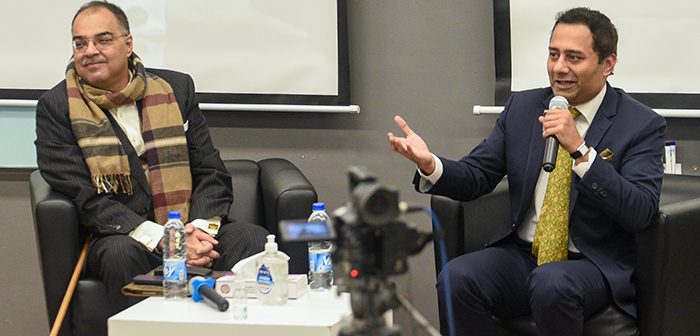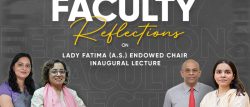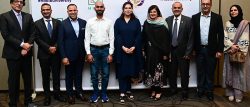On 20th January, 2023, Habib University hosted the first session of their intellectual initiative, Habib Talks, titled “Engaged citizen in times of economic challenges.” The speaker of the interactive session was Zafar Masud, President and CEO of the Bank of Punjab, and it was moderated by Dr. Aqdas Afzal, Assistant Professor of Social Development and Policy at Habib University.
The session was open to the public and drew a large audience, including students, teachers, policymakers, economists, and other members of the community. The goal of Habib Talks is to not only discuss the various developmental, humanitarian, economic, and political crises affecting the world and their implications for Pakistan, but also to advocate for the resolution of such crises.
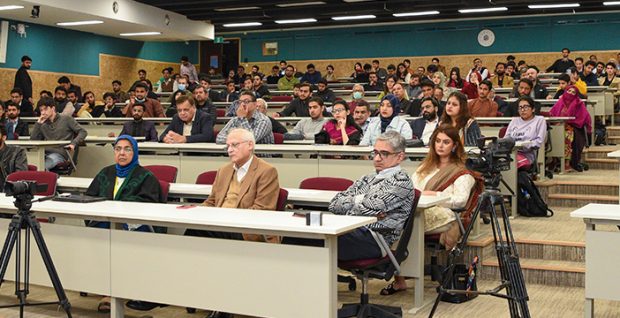 During the session, Zafar Masud spoke about the importance of a well-rounded personality for professionals and how liberal arts can play a role in achieving this and appreciated the work and generosity of Habib University, in this regard. He also emphasized the need for a more organic approach to addressing economic challenges, as opposed to relying on templates.
During the session, Zafar Masud spoke about the importance of a well-rounded personality for professionals and how liberal arts can play a role in achieving this and appreciated the work and generosity of Habib University, in this regard. He also emphasized the need for a more organic approach to addressing economic challenges, as opposed to relying on templates.
Dr. Aqdas Afzal moderated the session and asked Mr. Masud a question about how to manage the current economic crisis in Pakistan, specifically regarding inflation and the exchange rate policy. Mr. Masud responded by saying that moderation is key and that both extremes, such as a free float or fixed exchange rate, are not solutions. He also noted the success of countries like China and Vietnam in increasing their exportable surplus and suggested that Pakistan should take a similar approach. He also touched on the subject of Privatization, he believed that privatization is not the solution for every economic challenge. It should be used with caution and only in certain sectors where the private sector can perform better than the public sector.
The world is currently facing a global recession due to pandemics, wars, and climate disasters, and Pakistan is no exception. The country is struggling with a financial crisis and a high level of debt. In this changing socio-economic climate, it is increasingly important for citizens to be critically engaged in society. Mr. Zafar Masud also shared his unique perspective on the importance of being a good human being, drawing on his personal experience of surviving a plane crash in 2020. He also emphasized the need for addressing climate change as a socialist project at the global level.
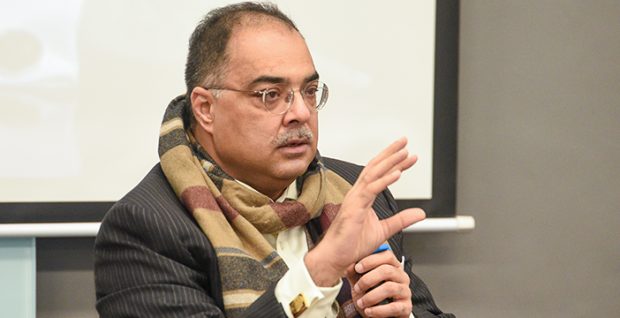 Mr. Masud’s proposed solutions to economic problems are unconventional, at least by local standards. On issues ranging from privatization and exchange rate management to the subsidized financing for businesses during Covid-19, he stands apart from the rest of the financial community in Pakistan. His ideas on economic challenges, the role of liberal arts, and the importance of a well-rounded personality have inspired the audience and created a thought-provoking discussion at the session.
Mr. Masud’s proposed solutions to economic problems are unconventional, at least by local standards. On issues ranging from privatization and exchange rate management to the subsidized financing for businesses during Covid-19, he stands apart from the rest of the financial community in Pakistan. His ideas on economic challenges, the role of liberal arts, and the importance of a well-rounded personality have inspired the audience and created a thought-provoking discussion at the session.
In conclusion, the Habib Talks session on “Engaged citizen in times of economic challenges” was a successful event that brought together a diverse group of individuals to discuss the pressing economic issues facing Pakistan. Zafar Masud’s unique perspective on these issues, as well as his emphasis on the importance of a well-rounded personality and a more organic approach to addressing economic challenges, provided valuable insights for the audience. The goal of Habib Talks is to continue to provide a platform for these important discussions and to advocate for the resolution of the various crises affecting Pakistan and the world.

